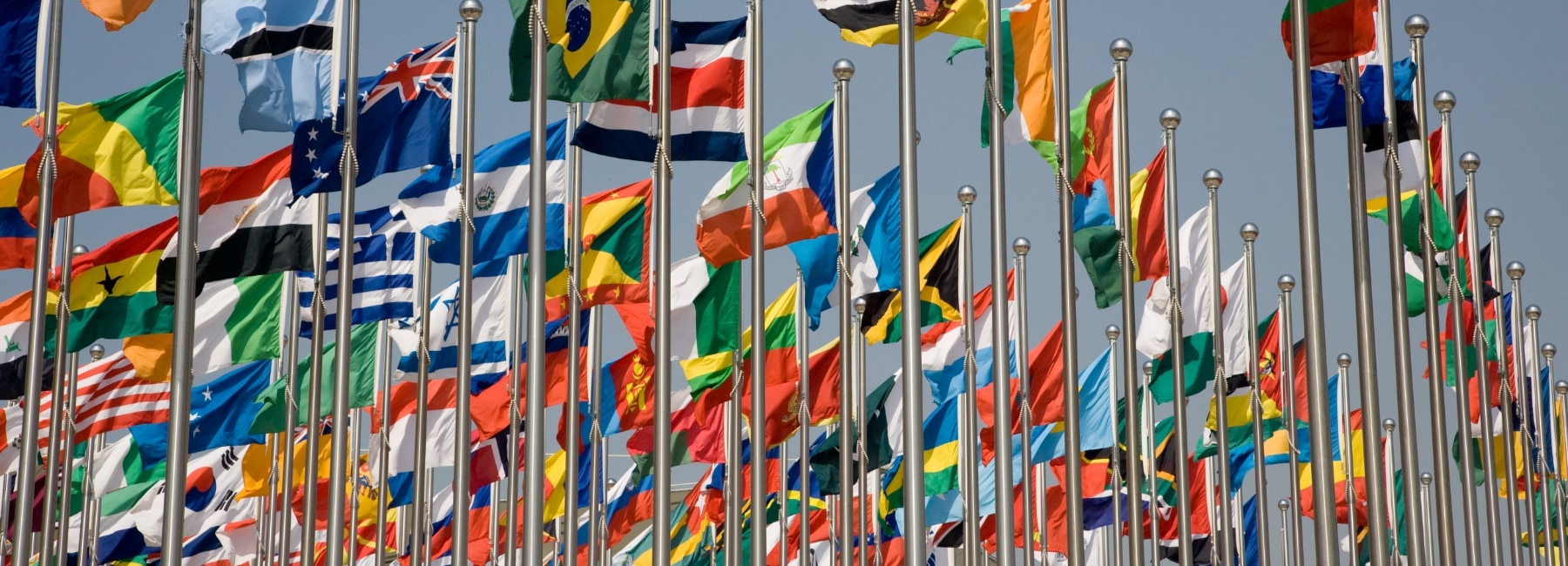Business Content
From A to Z: 26 International Business Terms

The global marketplace is full of specialized jargon and complicated abbreviations.
Here, we’ll demystify 26 tricky terms you’re likely to encounter as a small-business owner doing business across national borderlines:
If exports exceed imports, a country has a positive balance of trade.
- Arbitrage
The practice of taking advantage of price differences in different markets for the same product or asset, by buying low in one market and selling high in another market to make a profit. - Balance of Trade
The difference between a country’s total exports and imports of goods and services over a specific period of time, typically a year. If exports exceed imports, the country has a positive balance of trade, while if imports exceed exports, the country has a negative balance of trade. - Bill of Lading
A document issued by a carrier (such as a shipper or freight forwarder) to acknowledge receipt of goods for shipment, and which serves as a contract of carriage between the carrier and the shipper. - Buying Agent
A person or firm that is hired by a company to help identify and source suppliers or products in other countries, typically for the purpose of importing those products into the company’s home market. - Comparative Advantage
The ability of a country or firm to produce a particular product or service at a lower opportunity cost than another. This concept forms the basis for international trade, as entities seek to produce and export goods and services that they can produce more efficiently than others. - Customs
The government agency responsible for enforcing laws and regulations related to the movement of goods across international borders, including collecting duties and taxes, preventing illegal smuggling, and ensuring compliance with trade agreements. - Direct Exporting
A method of international market entry in which a company sells its products or services directly to customers in foreign markets, typically by establishing a distribution network or selling through online channels. - Duty
A tax or tariff imposed by a government on imported or exported goods, typically calculated as a percentage of the value of the goods. - Embargo
A government-imposed restriction on trade or economic activity with one or more countries or regions, typically for political or security reasons. - Expropriation
The seizure or nationalization of privately owned property by a government, typically without the owner’s consent or adequate compensation, often for political or economic reasons. - Force Majeure
An unforeseeable event or circumstance that is beyond the control of a party, such as a natural disaster, war, or government action, that makes it impossible or impractical to fulfill a contractual obligation. - High-Context Culture
A culture in which communication relies heavily on nonverbal cues, shared history, and social relationships rather than explicit messages. Doing business in high-context cultures may require more time and effort to build relationships and establish trust. - IBAN (International Bank Account Number)
A globally recognized and standardized numbering system that includes a unique combination of country code, bank code, branch code, and account number, used to identify bank accounts during cross-border transactions. - Incoterms
A set of standardized terms used in international trade to define the rights and responsibilities of buyers and sellers with regard to the delivery of goods, transportation costs, insurance, and other factors. Examples include cost, insurance, and freight and free on board. - Letter of Credit (L/C)
A financial instrument issued by a financial institution on behalf of a buyer, guaranteeing payment to a seller upon receipt of specified documents and compliance with agreed-upon terms and conditions. - Normal Trade Relations (NTR)
A status granted by one country to another, indicating that trade between the two countries will be conducted on a most-favored-nation basis, without discrimination or preferential treatment. - North American Free Trade Agreement (NAFTA)
An agreement signed in 1994 by the United States, Canada, and Mexico, which eliminated most tariffs and trade barriers between the three countries and created a trilateral trade bloc. - Political Risk
The potential that political or social events, such as changes in government, civil unrest, or terrorism, will affect the operations or profitability of a company doing business in a particular country or region. - Quota
A limit on the quantity or value of goods that can be imported into a country during a specified period, typically imposed for economic or political reasons. - Society for Worldwide Interbank Financial Telecommunication (SWIFT)
A global network used by banks and financial institutions to securely exchange messages and transactions related to international trade, payments, and other financial activities. - Spot Rate
The exchange rate at which a currency can be bought or sold for immediate delivery or settlement, as opposed to a forward rate, which is agreed upon for delivery at a future date. - Tariff
A tax imposed by a government on imported or exported goods, typically designed to protect domestic industries or generate revenue. - Value Added Tax (VAT)
A consumption tax applied to the value of goods and services, added at each stage of production or distribution; typically used by many countries as a major source of revenue. - Vienna Convention
An international treaty that regulates the sale of goods between parties located in different countries, setting out rules for contracts, delivery, payment, and other aspects of international trade. - World Trade Organization (WTO)
An international organization that promotes free trade by negotiating and enforcing trade agreements, settling disputes between member countries, and providing a forum for trade-related discussions and cooperation. - Zero-Sum
A situation in which one party’s gain is balanced by another party’s loss, so that total gains and losses add up to zero. In international trade, a zero-sum mentality implies that the gains of one country come at the expense of another country, although in reality, trade can create mutual benefits.
Defining Success
If you’re ready to put your knowledge into action, consult your financial institution.